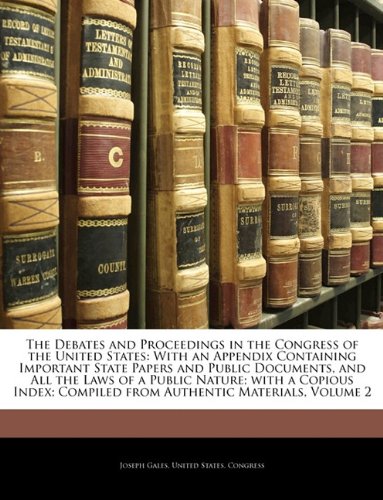Background
Joseph Gales was born on 4 February 1761, at Eckington, near Sheffield, England. He was the eldest son of Thomas Gales, a village school-teacher who has been described as “an Israelite in whom there was no guile. ”



(This is an EXACT reproduction of a book published before ...)
This is an EXACT reproduction of a book published before 1923. This IS NOT an OCR'd book with strange characters, introduced typographical errors, and jumbled words. This book may have occasional imperfections such as missing or blurred pages, poor pictures, errant marks, etc. that were either part of the original artifact, or were introduced by the scanning process. We believe this work is culturally important, and despite the imperfections, have elected to bring it back into print as part of our continuing commitment to the preservation of printed works worldwide. We appreciate your understanding of the imperfections in the preservation process, and hope you enjoy this valuable book.
https://www.amazon.com/Debates-Proceedings-Congress-United-States/dp/1143898656?SubscriptionId=AKIAJRRWTH346WSPOAFQ&tag=prabook-20&linkCode=sp1&camp=2025&creative=165953&creativeASIN=1143898656
journalist reformer political figure newspaper publisher
Joseph Gales was born on 4 February 1761, at Eckington, near Sheffield, England. He was the eldest son of Thomas Gales, a village school-teacher who has been described as “an Israelite in whom there was no guile. ”
Gales worked for his father and studied at night until he was thirteen years of age, at which time he was apprenticed to a printer in Manchester.
The printer’s shrewish wife threatened his life, and he fled with half a crown in his pocket to Eckington. He was then apprenticed to a kindly typographer in Newark- on-Trent, under whose guidance he became a master printer and binder.
He improved his knowledge of shorthand, learned French and Spanish.
Gales established himself in the printing and publishing business in Sheffield, where he founded the weekly Sheffield Register in 1787. His wife, a novelist and student of the classics, helped him to make a home to which reformers were attracted. He became popular with the radicals and laborers in North England. He applauded the French Revolutionists; he sold Thomas Paine's Rights of Man and befriended the author; he advocated the abolition of slavery and imprisonment for debt, universal manhood suffrage, and the reform of the judicial system; and he very actively supported the Constitutional Society. His strictures on the Pitt government brought upon him the condemnation of that government, and after the suspension of the habeas corpus, he fled to Altona, Schleswig-Holstein, in 1794. Mrs. Gales sold the Register to his assistant editor, James Montgomery, the poet, and with her two children joined her husband. He improved his knowledge of shorthand, learned French and Spanish, and soon sailed with his family for America, landing at Philadelphia, July 30, 1795, after an eventful voyage. He obtained employment first as a compositor, then as bookkeeper and reporter for the American Daily Advertiser, in which capacity he startled the Americans by making the first verbatim report of proceedings in Congress. He then bought and edited the Independent Gazetteer. Among his newly found friends were congressmen of North Carolina who persuaded him to establish a journal in their new state capital at Raleigh. He sold his paper to S. Harrison Smith and in the same year founded the weekly Raleigh Register (October 22, 1799), a Jeffersonian journal. He served as mayor of Raleigh nineteen years and was elected state printer annually after 1800 until Jackson's party ousted him. In 1832 he transferred his journal, printing establishment, and bookstore to his son Weston Raleigh Gales and went to live with his son Joseph in Washington. He compiled the first two volumes (1834) of the Annals of Congress published by Gales & Seaton, served as secretary of the Peace Society, and was six years secretary and treasurer of the American Colonization Society. An ardent Unionist and emancipationist, he nevertheless believed only the states had the right to emancipate slaves. In 1839 careless expenditures and severe criticisms of the Colonization Society led to the employment of a financial secretary in his place. Gales, nearly fourscore, retired and returned to Raleigh, where he died.
(This is an EXACT reproduction of a book published before ...)
An ardent Unionist and emancipationist, Gales nevertheless believed only the states had the right to emancipate slaves.
Gales applauded the French Revolutionists; he sold Thomas Paine’s Rights of Man and befriended the author; he advocated the abolition of slavery and imprisonment for debt, universal manhood suffrage, and the reform of the judicial system; and he very actively supported the Constitutional Society.
His strictures on the Pitt government brought upon him the condemnation of that government, and after the suspension of the habeas corpus, he fled to Altona, Schleswig-Holstein, in 1794.
Founding member of the Sheffield Society for Constitutional Information
Gales was able, alert, mild-tempered, firm in his convictions, stalwart in physique, and a champion of liberalism and the cause of labor. He became popular with the radicals and laborers in North England.
Joseph Priestley found in him a warm friend and helper in the cause of Unitarianism.
Among his newly found friends were congressmen of North Carolina who persuaded him to establish a journal in their new state capital at Raleigh.
Gales met Winifred Marshall, a cousin of Lord Melbourne, while in Newark-on-Trent, and married her on May 4, 1784.
10 January 1761 - 26 June 1839
17 February 1797 - 22 September 1822
17 November 1794 - 16 November 1827
1790 - 25 December 1863
1787 - 7 August 1825
20 April 1803 - 23 July 1848
10 April 1786 - 21 July 1860
